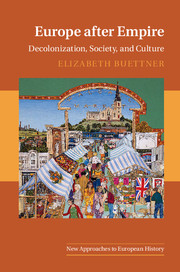Book contents
- Frontmatter
- Contents
- List of figures
- Acknowledgements
- Introduction
- Part I Decolonization for colonizers: Europe's transition to the postcolonial era
- Part II Migrations and multiculturalisms in postcolonial Europe
- 6 Ending empires, coming home: the ghost worlds of European colonial repatriates
- 7 Ethnic minority immigration from empires lost
- 8 Reconfiguring nations: identities, belonging, and multiculturalism in the wake of postcolonial migration
- Part III Memories, legacies, and further directions
- Epilogue: thoughts towards new histories of contemporary Europe
- Bibliography
- Index
7 - Ethnic minority immigration from empires lost
from Part II - Migrations and multiculturalisms in postcolonial Europe
Published online by Cambridge University Press: 05 June 2016
- Frontmatter
- Contents
- List of figures
- Acknowledgements
- Introduction
- Part I Decolonization for colonizers: Europe's transition to the postcolonial era
- Part II Migrations and multiculturalisms in postcolonial Europe
- 6 Ending empires, coming home: the ghost worlds of European colonial repatriates
- 7 Ethnic minority immigration from empires lost
- 8 Reconfiguring nations: identities, belonging, and multiculturalism in the wake of postcolonial migration
- Part III Memories, legacies, and further directions
- Epilogue: thoughts towards new histories of contemporary Europe
- Bibliography
- Index
Summary
Introduction
In 1965, The Times published a series of reports discussing Britain's ‘Dark Million’ – ‘immigrants’ from the nation's former colonies who had settled in large numbers, mainly after the Second World War. Rendering the link between Britain's imperial history and its current experiences of migration explicit, one segment launched with a stanza from Rudyard Kipling's 1899 poem ‘The White Man's Burden’, referring to the populations colonizers governed in the empire. The journalist reflected:
The heavy harness has been thrown off. The British Empire is gone. ‘New caught sullen peoples’ have been given independence and may live next door to old men who were alive when Kipling's verse was written. Well may they think that the British have been in retreat ever since they won the last war, and that the debris of a falling Empire has crashed into their own backyards.
In a Bradford café … I overheard two old men talking … They were lamenting the change – the coming of the Pakistanis with their alien habits. ‘Once we were great,’ [one] said. ‘We had the most powerful navy in the world. We used to export to India. Now their blokes come over here … Another old man, in Warwickshire, who had fought for his country and been badly wounded, also spoke of the days of glory when the Navy was strong. When coloured people came, he bought property to stop them coming next to his, to prevent the value falling.
In this rendition, imperial decline followed former greatness as Britain proved unable to defend its shores against the arrival of Pakistanis and others, peoples now rhetorically reconfigured as ‘debris’ once they came too close to home and encroached upon neighbourhoods, streets, and private homes.
With the decline and loss of empire, postcolonial migration became imagined as the new ‘white man's burden’ and ‘heavy harness’ as venerable aging war veterans made valiant efforts to protect the value of their homes. Peoples long ruled by the British overseas arrived deeply imbued with the history of empire – a history white Britons remembered and misremembered in equal measure. While some commentators imagined empire as signifying both a burden and a source of greatness for Britain, others provided less affirmative assessments.
- Type
- Chapter
- Information
- Europe after EmpireDecolonization, Society, and Culture, pp. 251 - 321Publisher: Cambridge University PressPrint publication year: 2016

